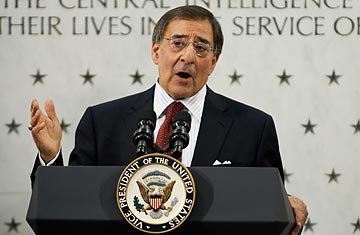
Director of the Central Intelligence Agency Leon Panetta
UPDATED: July 15, 2009
When Leon Panetta earlier this year was nominated as director of the CIA, the strongest argument in his favor was his long experience in dealing with Capitol Hill. With Democrats in Congress already sharpening their knives over the CIA's Bush-era policies and practices, the Agency would need protection — and Panetta, a veteran pol with contacts on both sides of the aisle but no real intel background, seemed the best possible shield.
Four months on, the CIA is indeed under siege from bellicose Democrats, but Panetta's vaunted skills seem to have done little to soften the blow. Some at agency headquarters in Langley, Va., now say he hasn't done enough to defend the CIA — and may have actually given its enemies some ammunition.
The current uproar concerns Panetta's controversial decision to immediately alert the congressional intelligence oversight committees about the secret terrorist-assassination program the CIA reportedly began developing (but never put into action) after Sept. 11, 2001. Informed of the program on June 23, Panetta told the committees the very next day.
For some CIA veterans, the haste was unseemly, and may have precipitated the controversy. "It was a moment for [Panetta] to take a deep breath," says a retired official who hears regularly from colleagues still in the agency. The director should have anticipated the reaction of the Democrats and come up with a smart way to communicate that this was "not a big deal," says the former official. Instead, by rushing to Congress, "he set off their alarm bells, and gave them the impression that it was a big deal." After all, says the official, the CIA has "God knows how many programs" that are never activated; and in any case, it was "perfectly sensible to examine all avenues of taking out the al-Qaeda leadership."
CIA spokesman George Little defends his boss, pointing out that "the program he killed was never fully operational and never took a single terrorist off the battlefield. Those are the facts he shared with Congress. This agency and this Director value a candid dialogue with Congress."
But an intelligence expert who has done contract work for the CIA says many in Langley feel Panetta, who had only weeks before testified that the agency did not lie to Congress, was acting "to protect his own skin," rather than in the agency's best interests. "He was looking to make sure nobody could accuse him of knowing about this program and being complicit in keeping it from Congress," says the official. (For his part, Panetta might well argue that it was the agency that misled and embarrassed him in the first place.)
Nevertheless, many CIA watchers take the opposite view. Panetta's handling of the secret program was "the one bright lining in this whole business," says Amy Zegart, a national security expert and professor of public policy at UCLA. By immediately shutting down the program, he "signaled that he has turned a new page at the CIA," she adds.
Distancing the agency from a project with Cheney's fingerprints was politically astute. "As a good politician, Panetta probably knew that [Cheney's involvement] was precisely the reason we should get nervous about it," says Paul Pillar, a former deputy director of the CIA's Counterterrorist Center.
Another official familiar with the matter says Panetta "understood the political context in which this whole thing unfolded, and recognized that there would be heat on this — even if the program never amounted to much. When something's not adequately briefed to Congress, unlike a fine wine, it doesn't get better with age."
Some argue that Panetta's tendency to look through a political lens is a weakness. "He's a decent guy, but I think he doesn't fully understand the intelligence business, and that hurts," says a former high-ranking operations official. An intel veteran, he argues, would have recognized the program for what it was — little more than an idea — and not rushed to inform Congress. But others, like Zegart, say Panetta's political chops may have saved the agency from even greater criticism. In any case, she says, "we don't know the counterfactual: How much worse would it have been [for the CIA] if Panetta was not the director?"
The daunting challenge for Panetta now, say the retired officials, is to get the Democrats to quit poking around the agency's past and focus on its future. "There's been too much discussion about what the CIA did in 2002-03, and not enough about what needs to be done in 2010-11," says a former official.
The retired operations official says he feels at least a little sympathy for Panetta — and worries about the legacy he will leave his successor. "No matter how this thing works its way out," he says, "who in the world would want to be the next director of the CIA?"
The original version of this story has been updated to incorporate comments from the CIA
